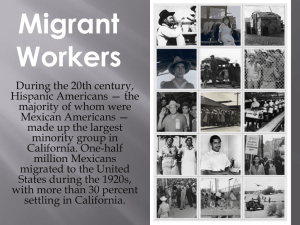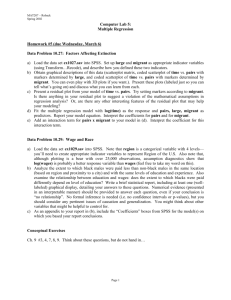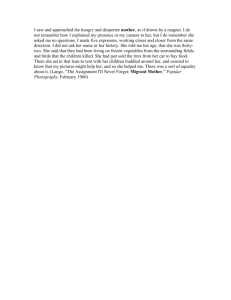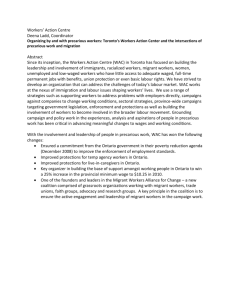Mise en page 1 - Canadian Council for Refugees
advertisement
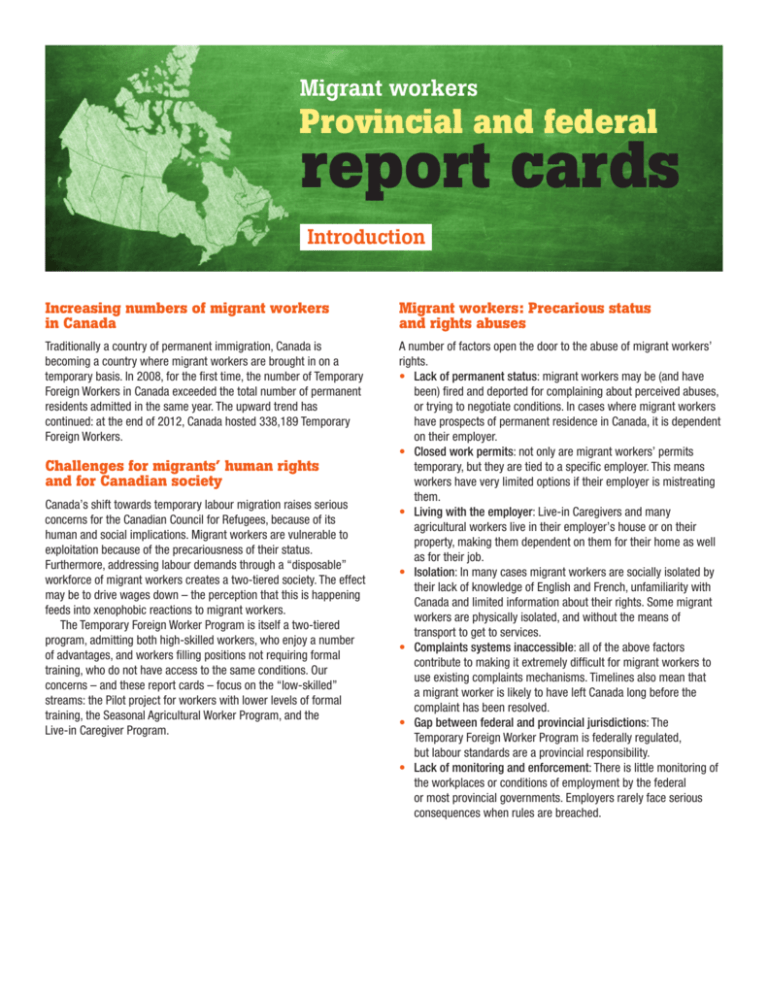
Migrant workers Provincial and federal report cards Introduction Increasing numbers of migrant workers in Canada Migrant workers: Precarious status and rights abuses Traditionally a country of permanent immigration, Canada is becoming a country where migrant workers are brought in on a temporary basis. In 2008, for the first time, the number of Temporary Foreign Workers in Canada exceeded the total number of permanent residents admitted in the same year. The upward trend has continued: at the end of 2012, Canada hosted 338,189 Temporary Foreign Workers. A number of factors open the door to the abuse of migrant workers’ rights. • Lack of permanent status: migrant workers may be (and have been) fired and deported for complaining about perceived abuses, or trying to negotiate conditions. In cases where migrant workers have prospects of permanent residence in Canada, it is dependent on their employer. • Closed work permits: not only are migrant workers’ permits temporary, but they are tied to a specific employer. This means workers have very limited options if their employer is mistreating them. • Living with the employer: Live-in Caregivers and many agricultural workers live in their employer’s house or on their property, making them dependent on them for their home as well as for their job. • Isolation: In many cases migrant workers are socially isolated by their lack of knowledge of English and French, unfamiliarity with Canada and limited information about their rights. Some migrant workers are physically isolated, and without the means of transport to get to services. • Complaints systems inaccessible: all of the above factors contribute to making it extremely difficult for migrant workers to use existing complaints mechanisms. Timelines also mean that a migrant worker is likely to have left Canada long before the complaint has been resolved. • Gap between federal and provincial jurisdictions: The Temporary Foreign Worker Program is federally regulated, but labour standards are a provincial responsibility. • Lack of monitoring and enforcement: There is little monitoring of the workplaces or conditions of employment by the federal or most provincial governments. Employers rarely face serious consequences when rules are breached. Challenges for migrants’ human rights and for Canadian society Canada’s shift towards temporary labour migration raises serious concerns for the Canadian Council for Refugees, because of its human and social implications. Migrant workers are vulnerable to exploitation because of the precariousness of their status. Furthermore, addressing labour demands through a “disposable” workforce of migrant workers creates a two-tiered society. The effect may be to drive wages down – the perception that this is happening feeds into xenophobic reactions to migrant workers. The Temporary Foreign Worker Program is itself a two-tiered program, admitting both high-skilled workers, who enjoy a number of advantages, and workers filling positions not requiring formal training, who do not have access to the same conditions. Our concerns – and these report cards – focus on the “low-skilled” streams: the Pilot project for workers with lower levels of formal training, the Seasonal Agricultural Worker Program, and the Live-in Caregiver Program. Consequences for migrant workers Report cards The vulnerability inherent in their status means that some migrant workers endure substandard conditions and exploitation, amounting in extreme cases to situations of trafficking in persons. Even when workers are not mistreated, the features of the program mean that they often experience prolonged separation from their families and long periods living in Canada without being able to participate in and contribute to society, given their isolation and lack of access to the full range of rights and services, including language instruction. Temporary labour migration is often gendered, racialized, and impacted by other systems of oppression, especially in the case of workers deemed “low-skilled”. We also acknowledge that Canada plays a role in creating the economic, environmental and political realities that force people to migrate in search of work. This project focuses on the approaches taken by provincial and federal governments to address the problems outlined above. The CCR welcomes the measures being adopted by some provinces to address the vulnerability of migrant workers. The report cards are intended to identify areas for improvement for provincial and federal governments and to raise awareness among the public and those concerned about migrant workers. The information in the report cards was compiled from responses received to questionnaires sent by the CCR to federal and provincial governments, CCR members and other groups engaged with migrant workers. These responses were complemented by additional research. The report cards offer only a summary of a complex and changing reality. More detailed reports exist, from which these cards have benefitted. For links to resources, visit: http://ccrweb.ca/en/migrant-worker-documents Recommendations EXPLANATION OF GRADES The grades are intended to give a general indication of where the province stands with respect to protection of migrant workers’ rights, both in relation to actions taken and commitment to improvements. For a detailed evaluation, please refer to the accompanying text. A Significant and innovative action taken and commitment to improvement B Considerable action taken or planned but significant gaps remain C Some limited action taken or commitment made D No action or commitment The massive expansion of the TFW program occurred without public discussion and urgently cries out for review. The CCR believes that Canada should return to its traditional policies of bringing in immigrants on a permanent basis, to contribute to all aspects of economic, social and cultural life. As long as migrant workers are being brought in to fill “low-skilled” positions, the following actions are particularly important to ensure that the basic rights of migrant workers are protected: • Proactive enforcement of laws protecting against abuse of migrant workers (by employers and recruiters) • Work permits that are not tied to a single employer • Avenues to permanent residence • Access to information and services The CCR thanks the many organizations and individuals who contributed to these report cards, particularly the CAW Social Justice Fund. CANADIAN COUNCIL FOR REFUGEES ccrweb.ca MAY 2013


